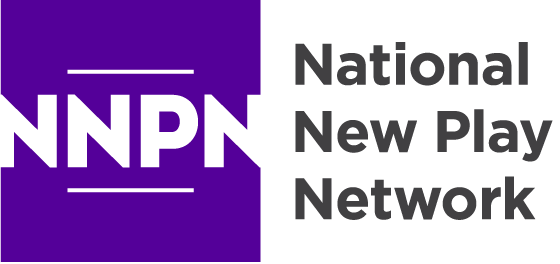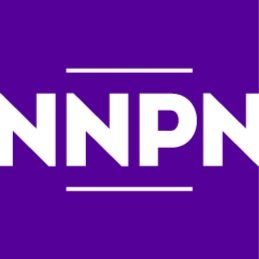Jordana Fraider's Exit Interview
A Conversation between Outgoing-Programs Director Jordana Fraider and Engagement Director Jess Hutchinson
Jordana & Jess at the 2019 Annual Conference at Unicorn Theatre
As the end of the 2021 Fiscal year on June 30 drew close, I sat down with Jordana to get her thoughts on where the Network and the field have been, where we might be headed, and her hopes for how we might build a better future together.
One of the great joys of my time as part of Team NNPN has been conversations with Jordana about big ideas and the beliefs that underpin them. It is a real pleasure to bring just a flash of this woman's insight, brilliance, passion, and service to you. I am happy for the time Jordana has been my colleague, but even more grateful that she will continue to be my friend.
JESS
When you imagine – in your sunset years many, many years from now – thinking back on your time at NNPN is there a moment or memory or some sort of talisman-y thing that comes to mind as “oh, this felt like my experience there?”
Nan & Jordana from the Showcase stage
JORDANA
There's a lot of those moments. Always those first moments of being in the lobby before everyone goes into the theater at Showcase or Annual Conference and being either on the stage or at some vantage point where I can kind of – like, I remember being at B Street [for 2018 Showcase] and being on one of their catwalks and looking down and just seeing all the people in the room. I mean, actually seeing all of the people in the room, all of the heads of the people, and being like: everyone is here. We are here. We are in this space together. That was always a “this is why we're doing this” moment. Which has also been challenged, or at least, I've been challenged to expand my thinking about “this is why we're doing this.” But those were always the most NNPN moments for me.
I think the moment that sticks in my mind that I'll probably hold on to for a long time – among many – is that moment in Orlando, on the second day of the [Strategic Planning] board retreat, where all the different small groups were reporting back and they were all like, “we have to realize our anti-racist values by ceding power and opening access to power by disambiguating core membership and board service.” And that, of course, was also the moment when I burst into tears publicly. But that was the time when – we all got there together. Nobody had to be forced to get there. And we all got there together. And it was based on a total perspective shift toward community focus. That was just very, very powerful for me, personally, because it felt like witnessing a moment of transformation in an action that was aligned with values. And that was pretty cool. So that's - I think those are the things that really stick.
In Orlando, with Lisa Q. Mount & Keryl McCord leading the retreat
JESS
So now – if you cast your mind back to your first day on the job, and then think about where you are now, how would you describe NNPN? Like the essence of it, not the mission, we can read the mission on the website, but what was the essence of NNPN on your first day, and how would you describe the essence of NNPN now?
JORDANA
I mean, not to set up a false binary but honestly, I think from member service to field service, from institution- centered to human-centered is really the evolution that I've witnessed. I just remember, early days, every time there was a sticky situation like a program issue, it was well, who do we serve? Whose interests are we going to prioritize? And the answer always was the Member Theaters. And now we’re coming to the realization that it can't just be the Member Theaters – you can't have a program that impacts individual artists, institutions, and the humans that make up those institutions without being careful and intentional about how all of those different needs from those constituencies are being met. So, to me, that's where we've gone from saying we just serve Member Theaters to saying we must serve everyone that we impact, including the audiences.
JESS
What's your biggest fear for the field as we move forward from here?
JORDANA
Can I say two that are interrelated? The overriding fear is that capitalism and the current economic structures that underpin our industry will make it impossible for folks to make real change in terms of how they make work, how they hold each other accountable, and how they serve audiences. But then I think the other piece is that no matter what work we are doing, no matter what work We See You White American Theater is doing to expose the real power holders: the unions, Broadway – the places where the power and the resources are concentrated – that there's no amount of social media exposure or calling out that is going to make any difference with those leadership structures. That's my fear for the whole planet, right? That the 1% is always going to be untouchable. And capitalism has set that up on purpose. Or maybe not on purpose, but it sure isn’t trying to undo that. And so that continues to be my fear. That we will never make a change because the actual power brokers are not interested in change.
JESS
And what's your greatest hope?
JORDANA
My greatest hope is that theaters can lean into the local. I think that the antidote for the aforementioned problem is to just get so relevant to the geographic population that you serve. And I think that I do see theaters starting to do that. But who are the artists? Who are the audiences? We are the regional theaters – we are in a specific geographic location. And what does that mean for the work that we do is? My biggest hope is that theaters can continue to meet the people in their neighborhood and figure out how to build relationships with them because that is their direct constituency.
JESS
What do you think NNPN’s role is in creating those relationships and encouraging folks to go local?
JORDANA
I guess part of it – and I’m so speaking in draft – I think what NNPN can do is allow theaters to get really intentional about their local work in their local communities without feeling like they are isolated and without support in doing so. That the Network is there to bolster that work by creating connections between theater companies, which also isn't to say that I think that theater companies should only be working with or producing local playwrights' work, that there should be no artistic exchange because that's not what I'm saying. But that when that happens, there's a real intentionality about it. Theaters can be where the unique becomes the universal as we do with storytelling, where we learn large truths about humanity by looking at very specific experiences of humans. That the field can learn large truths around anti-racism and anti-bias work by connecting very specifically or connecting about the very specific work that they're doing within their local communities, with their audiences, with their artists.
JESS
Is there anything else that you want folks to know as you move on to your next great adventure?
JORDANA
The truth that I see that allows all of that to happen is that the solutions to the problems that plague our industry are being actively enacted now by members of this organization. And we don't need to go – there's no outside expertise, the answers are within – and I think Annual Conference really demonstrated that – it truly is the collective genius and finding ways to listen and be open to learning and trying to adapt models that other theaters are doing. Yes, there are things to be learned by looking at other industries, like about HR departments, but also I think that even within NNPN there are probably examples of theaters that do HR in a really great way, and we just haven't found a way to recognize or lift them up. Every community has, within itself, the solutions to the problems it faces. The resources are there, it's about finding out how to access them. I think that is also true with NNPN.
Cheers to you, Jordana - and thank you for everything you've done to make the Network work. We love you.






